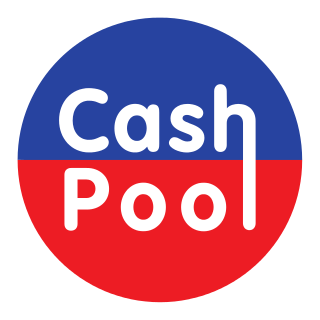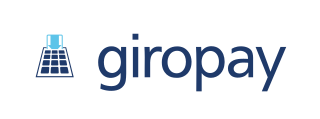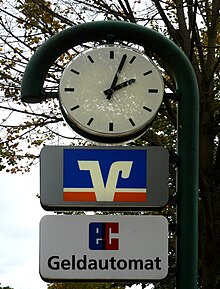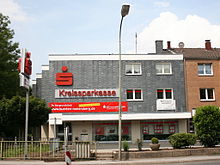
A debit card, also known as a check card or bank card, is a payment card that can be used in place of cash to make purchases. The card usually consists of the bank's name, a card number, the cardholder's name, and an expiration date, on either the front or the back. Many of the new cards now have a chip on them, which allows people to use their card by touch (contactless), or by inserting the card and keying in a PIN as with swiping the magnetic stripe. These are similar to a credit card, but unlike a credit card, the money for the purchase must be in the cardholder's bank account at the time of the purchase and is immediately transferred directly from that account to the merchant's account to pay for the purchase.

Electronic funds transfer at point of sale is an electronic payment system involving electronic funds transfers based on the use of payment cards, such as debit cards or credit cards, at payment terminals located at points of sale. EFTPOS technology was developed during the 1980s.
Electronic cash was, until 2007, the debit card system of the German Banking Industry Committee, the association that represents the top German financial interest groups. Usually paired with a transaction account or current account, cards with an Electronic Cash logo were only handed out by proper credit institutions. An electronic card payment was generally made by the card owner entering their PIN at a so-called EFT-POS-terminal (Electronic-Funds-Transfer-Terminal). The name "EC" originally comes from the unified European checking system Eurocheque. Comparable debit card systems are Maestro and Visa Electron. Banks and credit institutions who issued these cards often paired EC debit cards with Maestro functionality. These combined cards, recognizable by an additional Maestro logo, were referred to as "EC/Maestro cards".

A transaction account, also called a checking account, chequing account, current account, demand deposit account, or share draft account at credit unions, is a deposit account or bank account held at a bank or other financial institution. It is available to the account owner "on demand" and is available for frequent and immediate access by the account owner or to others as the account owner may direct. Access may be in a variety of ways, such as cash withdrawals, use of debit cards, cheques and electronic transfer. In economic terms, the funds held in a transaction account are regarded as liquid funds. In accounting terms, they are considered as cash.

Mastercard Maestro is a brand of debit cards and prepaid cards owned by Mastercard that was introduced in 1991. Maestro is accepted at around fifteen million point of sale outlets in 93 countries.

Visa Debit is a major brand of debit card issued by Visa in many countries around the world. Numerous banks and financial institutions issue Visa Debit cards to their customers for access to their bank accounts. In many countries the Visa Debit functionality is often incorporated on the same plastic card that allows access to ATM and any domestic networks like EFTPOS or Interac.

Payment cards are part of a payment system issued by financial institutions, such as a bank, to a customer that enables its owner to access the funds in the customer's designated bank accounts, or through a credit account and make payments by electronic transfer with a payment terminal and access automated teller machines (ATMs). Such cards are known by a variety of names, including bank cards, ATM cards, client cards, key cards or cash cards.

An ATM card is a dedicated payment card card issued by a financial institution which enables a customer to access their financial accounts via its and others' automated teller machines (ATMs) and, in some countries, to make approved point of purchase retail transactions. ATM cards are not credit cards or debit cards, however most credit and debit cards can also act as ATM cards and that is the most common way that banks issue cards since the 2010s.
Debit card cashback is a service offered to retail customers whereby an amount is added to the total purchase price of a transaction paid by debit card and the customer receives that amount in cash along with the purchase. For example, a customer purchasing $18.99 worth of goods at a supermarket might ask for twenty dollars cashback. The customer would approve a debit payment of $38.99 to the store, and the cashier would then give the customer $20 in cash.
ATM usage fees are the fees that many banks and interbank networks charge for the use of their automated teller machines (ATMs). In some cases, these fees are assessed solely for non-members of the bank; in other cases, they apply to all users. There is usually a higher fee for use of White-label ATMs rather than bank owned ATMs.
The Global ATM Alliance is a joint venture of several major international banks that allows customers of their banks to use their automated teller machine (ATM) card or debit card at another bank within the alliance with no international ATM access fees. Other fees, such as an international transaction or foreign currency fee, may still apply for some account holders. Participating banks are located around the globe.

EUFISERV is a European interbank network connecting the ATMs of savings banks in Austria, Belgium, the Czech Republic, Finland, France, Germany, Italy, the Netherlands, Norway, Portugal, Spain, Sweden, and Switzerland. It is the largest and the only international credit union-owned interbank network in Europe.

Cash Group is a cooperation of the four largest German private banks and their subsidiaries, in which they mutually waive ATM usage fees for their customers. It is not an interbank network but uses the pre-existing girocard network. With more than 7000 ATMs, the cooperating banks' ATM networks form the third largest ATM network in Germany.

CashPool is a cooperation of a multitude of smaller or virtual German private banks, in which they mutually waive ATM usage fees for their customers. It is not an interbank network but uses the pre-existing German ATM or Maestro/Cirrus networks. With more than 3200 ATMs, the cooperating banks' ATM networks form the smallest ATM group in Germany.
The Euro Alliance of Payment Schemes (EAPS) was an international alliance of European bank and interbank networks that had aimed to creating a pan-European debit card system in the Single Euro Payments Area to rival Visa and Mastercard using existing country specific systems. It was launched in 2007 with the support of the European Union but failed and was abandoned sometime after 2013.

A bank is a financial institution that accepts deposits from the public and creates a demand deposit while simultaneously making loans. Lending activities can be directly performed by the bank or indirectly through capital markets.

girocard is an interbank network and debit card service connecting virtually all automated teller machines (ATMs) and banks. It is based on standards and agreements developed by the German Banking Industry Committee.

Giropay is an Internet payment System in Germany, based on online banking. Introduced in February 2006, this payment method allows customers to buy securely on the Internet using direct online transfers from their bank account. The system is similar to the Dutch iDEAL payment system, MyBank payment system, the Interac online service in Canada, pagomiscuentas payment service in Argentina, and Secure Vault Payments in the United States. Giropay was owned by giropay GmbH until December 2020, when it was acquired by paydirekt. The two began a merger in May 2021.

Debit Mastercard is a brand of debit cards provided by Mastercard. They use the same systems as standard Mastercard credit cards but they do not use a line of credit to the customer, instead relying on funds that the customer has in their bank account.
The German Banking Industry Committee (GBIC), known until 2011 as the Central Credit Committee is an industry association of the German banking industry. Its decisions are held normative for the national banking sector – either directly by interbank treaties or indirectly by preparing a corresponding ministerial or Bundesbank decision.















